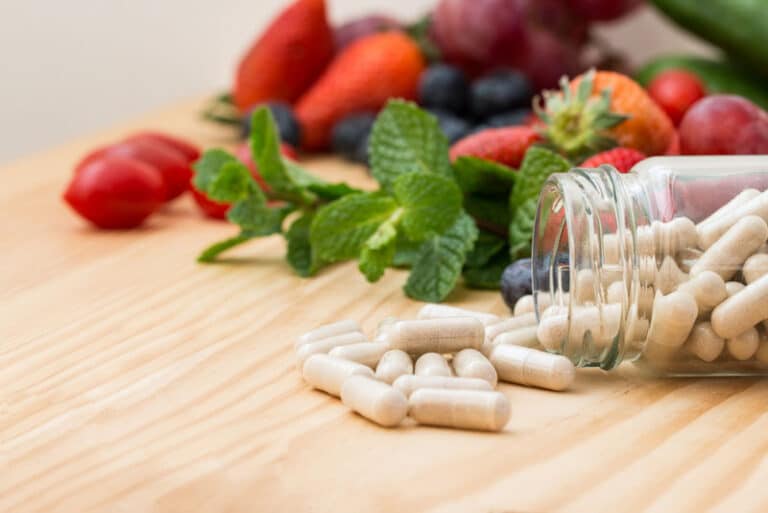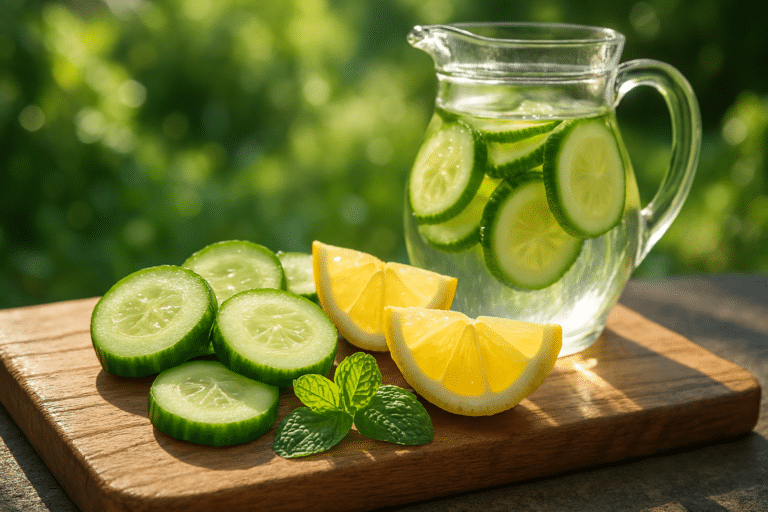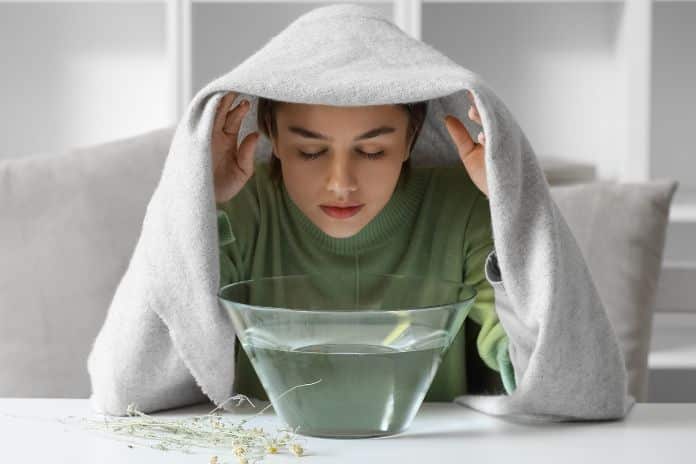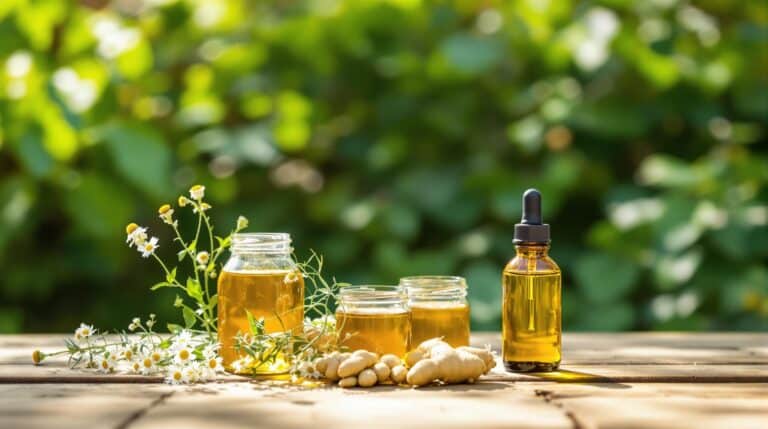7 Natural Home Remedies to Restore Balance and Combat Bacterial Vaginosis
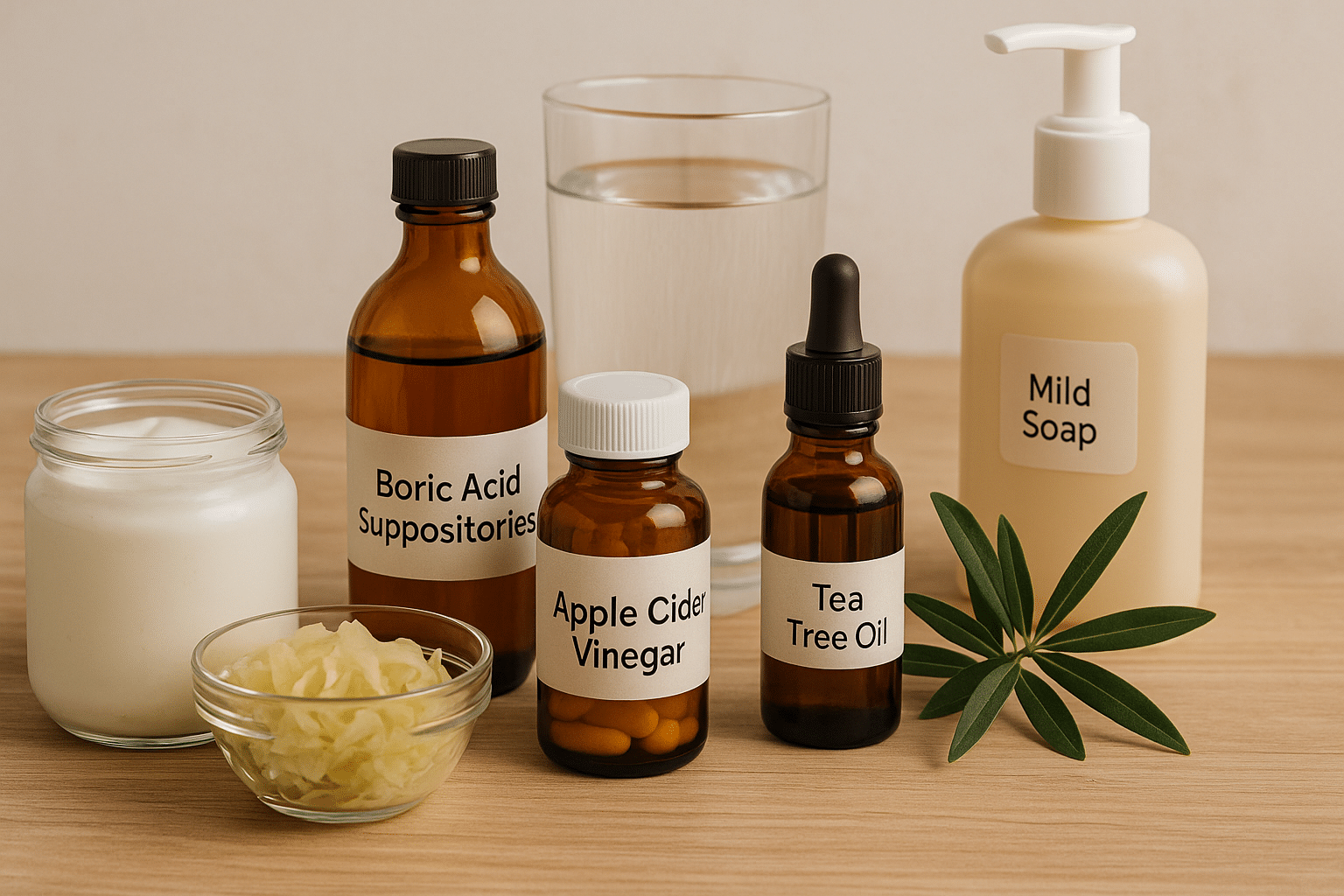
If you’re dealing with bacterial vaginosis (BV), you might be searching for effective, natural remedies to restore balance. Several options can help you regain a healthier vaginal environment without relying solely on antibiotics. From probiotics to tea tree oil, these remedies offer potential solutions worth considering. But which ones are most effective, and how can you incorporate them into your routine? Let’s explore these natural approaches to find the right fit for you.
Probiotics: Rebalancing Your Vaginal Flora
When you’re dealing with bacterial vaginosis (BV), probiotics can play an essential role in rebalancing your vaginal flora. Research shows that combining probiotics with antibiotics considerably boosts your chances of curing BV compared to antibiotics alone.
Probiotics, especially *Lactobacillus rhamnosus*, can be taken orally for better results. They work by recolonizing your vaginal mucosa with beneficial bacteria, inhibiting harmful pathogens, and restoring your natural acidic pH. Vaginal pH levels above 4.5 may indicate BV, highlighting the importance of maintaining a balanced vaginal environment. While short-term use of probiotics remarkably reduces recurrence, their long-term effectiveness may diminish after 30 days.
Boric Acid Suppositories: A Preventive Approach
Boric acid suppositories can play an essential role in preventing bacterial vaginosis by restoring your vaginal pH balance and controlling harmful bacteria. When used according to guidelines, these suppositories help maintain normal vaginal flora, making them an effective preventive measure. Understanding how to use them properly can enhance your overall vaginal health and reduce the risk of recurrence. Additionally, boric acid is known for its antifungal and antimicrobial properties, which contribute to its effectiveness in managing vaginal health.
Mechanism of Action
While exploring preventive approaches for bacterial vaginosis, you may find boric acid suppositories particularly effective due to their multifaceted mechanism of action.
They inhibit the growth of harmful bacteria and disrupt biofilm formation, which is essential for persistent infections. By restoring acidic vaginal pH, boric acid creates an environment that supports beneficial bacteria while inhibiting harmful ones.
It also targets both bacterial and fungal biofilms, enhancing susceptibility to your immune system and other treatments. Additionally, boric acid may modulate your immune response, reducing inflammation and promoting a balanced vaginal ecosystem. This combination of actions not only helps to alleviate symptoms but also reduces the risk of recurrence, making it a valuable preventive tool. Furthermore, the average weight of boric acid is approximately 61.833, highlighting its commonality in various formulations.
Usage Guidelines
One effective way to use boric acid suppositories as a preventive measure against bacterial vaginosis is by following specific dosage and administration guidelines.
Start with an induction phase, using a 600 mg suppository daily for 7 to 14 days. After this, switch to maintenance dosing of 300 mg or 600 mg 2–3 times per week. Standard antibiotics have a 70-80% cure rate after one month, but adding boric acid may enhance effectiveness.
Always insert suppositories intravaginally and avoid using them if you have sores or ulcers. Remember to wash your hands before and after insertion to reduce infection risk.
Store suppositories away from moisture and heat to maintain their integrity. Monitor for any side effects, and consult your healthcare provider if you experience burning or irritation during use.
Apple Cider Vinegar: Balancing Vaginal Ph
Apple cider vinegar (ACV) is a popular natural remedy known for its ability to help balance vaginal pH levels. Its acidic nature works to normalize pH, creating an environment less favorable for harmful bacteria. Many women have reported that self-help remedies did not help and sometimes worsened symptoms, highlighting the importance of using ACV cautiously.
You can consume ACV diluted in water or as a dietary supplement to experience its benefits. Keep in mind that high doses can be harmful, so moderation is key.
While ACV offers antibacterial effects that may help reduce bacterial growth, it’s essential not to apply it directly to the vagina, as this could cause tissue damage.
Always consult a healthcare professional before using ACV for bacterial vaginosis to verify it’s safe and effective for your situation.
Tea Tree Oil: Antimicrobial Properties
Tea tree oil (TTO) is another powerful natural remedy that can complement the benefits of apple cider vinegar in managing bacterial vaginosis. Its antimicrobial properties make it a potential ally in your journey to restore vaginal health.
Tea tree oil is a potent natural remedy that enhances apple cider vinegar’s benefits for bacterial vaginosis and supports vaginal health.
Here are some key points about TTO:
- Active Ingredient: Derived from Melaleuca alternifolia, TTO fights various infections.
- Bacterial Inhibition: It effectively inhibits multiple common bacteria strains.
- Fungal and Viral Activity: TTO also combats fungi and viruses, offering a broad spectrum of antimicrobial effects.
- Application Forms: You can find TTO in creams, ointments, and solutions for topical use. Additionally, essential oils show low induction of bacterial resistance due to their multiple action modes, suggesting they can serve as alternatives to conventional therapies.
However, always remember to dilute TTO before applying, as undiluted oil can cause irritation.
Dietary Changes: Fermented Foods and Hydration
Incorporating fermented foods into your diet can markedly boost your vaginal health by restoring the balance of beneficial bacteria. Foods like kefir, sauerkraut, and kombucha provide probiotics that help prevent bacterial vaginosis. Additionally, staying hydrated daily supports your overall mucosal health, making it easier for your body to maintain a balanced vaginal environment. This is particularly important as bacterial vaginosis results from an imbalance in vaginal bacteria. Moreover, consuming organic food can further enhance your health by reducing exposure to harmful chemicals.
Importance of Fermented Foods
Many people overlook the significant role fermented foods can play in maintaining vaginal health, especially when it comes to combating bacterial vaginosis (BV). Incorporating these foods into your diet can have a profound impact.
Here are some benefits of fermented foods:
- Probiotics: They contain live probiotics, particularly *Lactobacillus* strains, that help restore healthy vaginal flora.
- pH Balance: Regular consumption can lower vaginal pH, creating an environment less hospitable to harmful bacteria. Research indicates that Lactobacillus species are the dominant “good” bacteria in a healthy vagina, further supporting the importance of fermented foods. Additionally, maintaining a balanced microbiome is crucial for preventing recurrent infections.
- Diversity: Foods like yogurt, kefir, and kimchi provide a variety of beneficial strains for overall health.
- Support Recovery: Fermented foods can complement antibiotic treatments by recolonizing the vaginal microbiome, helping to prevent BV recurrence.
Incorporating these foods can be a game-changer for your vaginal health.
Staying Hydrated Daily
Staying hydrated daily is essential for your overall health, including vaginal well-being. Women typically need about 2.75 liters of water each day, but this can vary based on your activity level and personal needs. Proper hydration supports your body’s natural processes, which is critical for maintaining vaginal health and preventing infections. It helps maintain fluid balance and supports a healthy vaginal microbiome, discouraging harmful bacterial growth. Additionally, drinking enough water alleviates discomfort caused by bacterial vaginosis. Incorporating hydrating foods like cucumbers and melons into your diet can further boost your hydration levels. Research shows that hydration affects vaginal health significantly, emphasizing the importance of consistent water intake.
Proper Hygiene: Best Practices for Vaginal Health
Proper hygiene is essential for maintaining vaginal health and preventing infections, especially bacterial vaginosis.
Maintaining proper hygiene is crucial for vaginal health and preventing infections like bacterial vaginosis.
By following these best practices, you can support your vaginal microbiome and minimize the risk of infections:
- Wash your genitals once or twice a day with mild soap and water.
- Avoid douching, as it disrupts the natural cleaning processes of the vagina.
- Use dry paper to wipe after urination or bowel movements to prevent irritation.
- Limit the use of feminine hygiene products, which can cause discomfort and infections.
Herbal and Supplement Remedies: Exploring Natural Options
Maintaining good hygiene is just one part of supporting your vaginal health; exploring herbal and supplement remedies can also play a significant role in managing bacterial vaginosis (BV).
Probiotics help restore your vaginal flora balance, while garlic supplements offer natural antibacterial effects. Boric acid suppositories are effective for treating BV, and tea tree oil provides antifungal and antibacterial properties.
Apple cider vinegar may help with pH balance. Consider bearberry leaves for their antibacterial qualities and sage for general health benefits.
While these remedies can be cost-effective and may reduce symptoms, always consult your healthcare provider before starting any new treatment, especially if you’re pregnant or have allergies.
Frequently Asked Questions
Can Bacterial Vaginosis Be Sexually Transmitted?
Yes, bacterial vaginosis can be sexually transmitted. Engaging in sexual activity, especially with new or multiple partners, increases your risk. Practicing safe sex and open communication with partners can help reduce transmission chances.
How Often Can I Use Boric Acid Suppositories?
You can use boric acid suppositories daily for 1 to 2 weeks for bacterial vaginosis. For maintenance, consider using them 2 to 3 times a week, but always consult your healthcare provider first.
Are There Any Side Effects of Probiotics?
Yes, probiotics can cause mild side effects like bloating and gas. However, they’re generally safe for most people. Just be cautious if you have a compromised immune system or are taking certain medications.
What Lifestyle Changes Help Prevent Bacterial Vaginosis?
To prevent bacterial vaginosis, you should focus on a healthy diet, practice good hygiene, wear breathable clothing, manage stress, stay hydrated, and maintain regular health check-ups. These changes can greatly enhance your overall well-being.
When Should I See a Doctor for Bacterial Vaginosis?
If you notice unusual vaginal discharge, especially with a strong odor, or experience itching, pain, or fever, you should see a doctor. Persistent symptoms despite home treatments warrant professional evaluation to rule out infections.
Conclusion
Incorporating these natural remedies can help restore balance and combat bacterial vaginosis effectively. By using probiotics, boric acid, and apple cider vinegar, along with maintaining proper hygiene and a healthy diet, you can support your vaginal health. Don’t forget the power of tea tree oil and hydration in this journey. Always remember to consult your healthcare provider before trying new treatments to guarantee they’re right for you. Your well-being is worth the effort!
References
- https://www.medicalnewstoday.com/articles/317562
- https://www.intimaterose.com/blogs/womens-health/home-remedies-bacterial-vaginosis
- https://pmc.ncbi.nlm.nih.gov/articles/PMC4807032/
- https://khealth.com/learn/bacterial-vaginosis/home-remedies-for-bacterial-vaginosis/
- https://yourdoctors.online/natural-remedies-for-bacterial-vaginosis-and-medications/
- https://pmc.ncbi.nlm.nih.gov/articles/PMC9195231/
- https://www.verywellhealth.com/probiotics-for-bacterial-vaginosis-5272217
- https://www.health.harvard.edu/blog/should-you-use-probiotics-for-your-vagina-2019122718592
- https://pubmed.ncbi.nlm.nih.gov/35698149/
- https://www.imrpress.com/journal/CEOG/50/3/10.31083/j.ceog5003050

